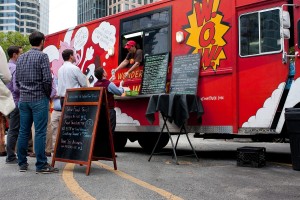 From large cities to small towns, food trucks are everywhere and have attained mainstream status among consumers. Want to get in on the craze? There’s a lot to think about first. Here are four important questions to consider when starting a food truck business:
From large cities to small towns, food trucks are everywhere and have attained mainstream status among consumers. Want to get in on the craze? There’s a lot to think about first. Here are four important questions to consider when starting a food truck business:
1. What type of truck should I get, how much can I expect to invest in it, and where can I find the right vehicle?
Food trucks can be purchased for as little as $25,000 and as much as $125,000. While it may be tempting to cut corners on your truck investment because you’re just starting a food truck business and aren’t certain how it will pan out, try to overcome this urge. The better the condition of the vehicle, the less money you’ll need to spend on getting it into shape for the road—and the more money you’ll have available to invest in top-notch food preparation and other equipment needed to boost your business’ potential for success.
A secondhand truck can be a great option when you’re just starting a food truck business. To find one, start by reaching out to other food truck operators in your area, as they may be willing to provide leads (especially if you’ll be selling a different type of food than the fare they offer). You can also try companies that typically have used box trucks they want to sell. FedEx, UPS, and bread and milk companies fall into this category.
A diesel truck may be a better bet to take advantage of lower gas prices. However, don’t buy one until you’ve learned more about its engine and parts so you can save money later by handling minor repairs yourself.
2. What type of POS system and related technology do I need?
At a time when credit and debit, rather than cash, is king, food truck operators must be able to accept all types of payment, rather than just coins and bills, if they are to avoid turning away hungry customers. This means using a POS system with credit and debit card payment processing capabilities.
Additionally, the cramped quarters in most food trucks make it advisable to use a tablet-based mobile POS system that occupies minimal space on the counter. The system should have a built-in credit card reader. When considering the POS in preparation for starting a food truck business, you may also want to consider a system that allows you to accept orders and mobile payments made on and transmitted from customers’ mobile phones as they await service at your establishment.
3. What are the rules concerning food preparation and other issues, and how should I proceed?
While anyone who’s just starting a food truck business may assume it is okay to prepare food at home or on the truck, this isn’t the case. State and local health jurisdictions mandate the use of commercial kitchens, or commissaries, to prepare food to be sold from food trucks. You can opt for a catering company kitchen or a restaurant kitchen. Finding a commissary may be challenging; start by asking other food truck operators where their food is prepared.
Other laws dictate truck size, vending locations and hours, sanitation practices, and more. These laws change frequently, so resolve to be flexible and to alter your business model or practices accordingly.
4. Other than just parking on the street, how will I find customers?
Finding customers when you’re starting a food truck business may seem like a tough task, but it needn’t be. Food trucks can quickly respond to demand, so set up accounts on, and use, Facebook, Twitter and Yelp to interact with customers and let them know where the truck will be each day. Kick things up a notch by providing digital coupons to social media followers and responding to reviews.
When approached properly, starting a food truck business is a great way to break into foodservice and make good money. Considering the above four questions and looking at all angles lays a strong foundation for success in this potentially lucrative market.






